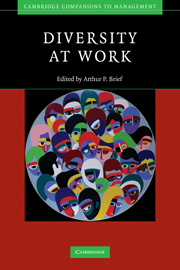Book contents
- Frontmatter
- Contents
- List of figures
- List of tables
- List of contributors
- Foreword
- Preface
- 1 Introduction: Where the sweet spot is: Studying diversity in organizations
- Part I Conceptual foundations
- Part II Emerging theoretical approaches
- Part III Moving ahead: Agendas for practice and research
- Index
- References
1 - Introduction: Where the sweet spot is: Studying diversity in organizations
Published online by Cambridge University Press: 19 May 2010
- Frontmatter
- Contents
- List of figures
- List of tables
- List of contributors
- Foreword
- Preface
- 1 Introduction: Where the sweet spot is: Studying diversity in organizations
- Part I Conceptual foundations
- Part II Emerging theoretical approaches
- Part III Moving ahead: Agendas for practice and research
- Index
- References
Summary
Since 2000, 19% and 14% of the work published in peer-reviewed psychology and sociology journals (respectively) dealt with race or gender or diversity. Much of this work is based on a deep theoretical foundation and demonstrates innovative social science methods. It is rigorous, empirical, and exciting.
Having established that these topics were receiving significant research attention in the social sciences, we did a similar search in the Academy of Management journals. Since 2000, only 5% of organizational research tackled these topics. What does this small percentage imply about the other 95% of organizational scholarship? What assumptions rest in most organizational work about the composition of the workforce, particularly the racial composition?
In fact, most of organizational scholarship looks as if no people of color work in organizations, else we would see more attention paid to research topics such as race and racism, as well as those often entwined with race – social class, immigration status, and coping with discrimination. As of now, all of these topics remain neglected in the management literature. In this chapter, we introduce this volume about diversity at work with a focused look at the topic we see most lacking in organizational research: race. We believe this narrow focus is required, given the infrequent attention the topic is receiving in our top journals and the serious racial inequalities that exist in organizations.
- Type
- Chapter
- Information
- Diversity at Work , pp. 1 - 10Publisher: Cambridge University PressPrint publication year: 2008
References
- 4
- Cited by



